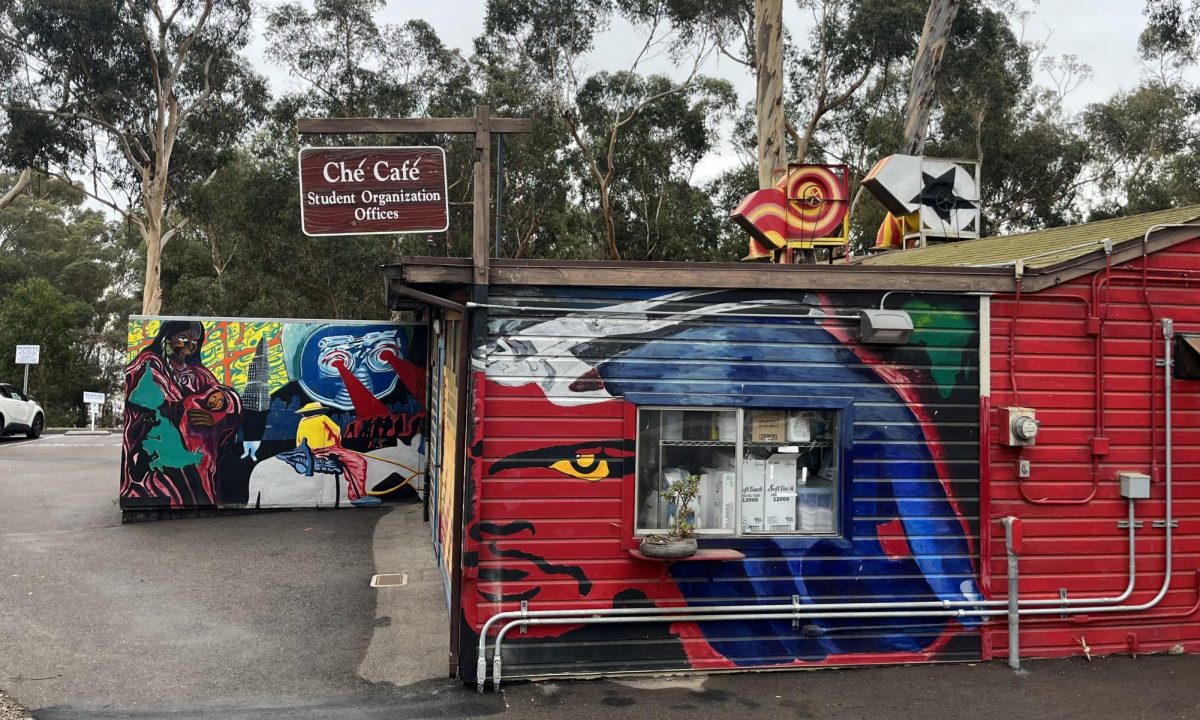Editor’s note: Interviewees were granted confidentiality and anonymity over privacy concerns.
The Che Café Collective, an on-campus venue, announced on Nov. 15 on its Instagram that it would implement a temporary bag-checking policy to protect its sober space. The post prompted over 800 comments, with some users alleging the venue of neglecting ongoing assault and boundary violations, uncovering larger problems that the collective has failed to address.
The Che is a student and community space that has been in continuous operation on campus since 1990. Dating back 50 years, the space is home to a DIY venue, vegan cafe, and radical space run by volunteers, autonomous from the school.
The Instagram post announced that if attendees are caught breaking their sober policy, they will be asked to leave the venue.
“Respect the space. Respect the volunteers. Respect each other. Have fun. Stop hurting each other,” the caption read.
The post was met with mixed reactions, with some users applauding the venue for promoting an age-appropriate safe space, while others commented that there are more dire issues that should be addressed. Several users commented on the collective’s continued lack of action toward sexual harassment, abuse, and the protection of repeated abusers within its venue.
One former volunteer and band performer at the Che, who wished to stay anonymous, spoke with The UCSD Guardian about his experience.
“I have had so many terrible experiences there myself,” he said, claiming that a week before the Che posted on Instagram, there were already allegations made against the venue for allowing known rapists in the space.
“I’ve witnessed it so many times where I or my friends have seen somebody we know or have personally have experience with being like ‘hey, this person is not safe, we want to get them out of here so nobody can get hurt’ and have just been completely ignored by everybody there,” he commented. “It’s been like that for so long in this space, and so many times a week I’m hearing more and more people sharing their stories of that.”
The former volunteer and performer, who had been a regular at the Che for nearly two years, recounted consistently experiences at the venue, including sexual harassment, physical assault, and volunteers not having rapists removed from the grounds.
“It’s almost every show — something terrible is happening to somebody,” he said. Once, he talked to a collective member about his negative encounter with an attendee but never heard back from them.
In an interview with The Guardian, three representatives of the Che, who wished to stay anonymous, shared that they felt “heartbroken” given the comments following their post.
“We’ve actually been working pretty hard for the last three years to implement a brave space policy — rather than a safe space policy — and a restorative justice policy,” they said. “To hear that people have had bad experiences here was really disheartening, worrying, and concerning.”
Following the influx of abuse allegations on their Instagram post, the Che representatives recalled feeling frustrated, hoping that protecting a sober environment through a bag-checking policy would link to a safer environment for its attendees.
“They are intrinsically linked, and to see people not recognize that, and not care, and seem to not understand why we had done this — I was confused as to why the reaction was what it was,” one representative commented. “We put countless hours into trying to keep this place a safer venue and trying to listen and believe survivors, and it felt terrible to see so many people commenting that they thought the opposite.”
Recalling the environment the Che fosters, the former performer said that more appropriate measures could have been addressed to prioritize the safety of its attendees.
“I do agree that both ideas go into keeping people safe, but I don’t think [the Che has] ever publicly addressed the allegations, so I think just ignoring them, and not actually doing anything about the allegations just looks really bad,” he said. “If you don’t mention it, nobody is going to think that they are linked.”
Other individuals also voiced their disappointment with how the Che handled these allegations.
Having been to events at the venue herself, UC San Diego Action Co-founder Meghan Traynor called for others to come together to bring accountability to the Che. In response, the Che requested UCSD Action to wait for an updated social media post.
One week later, on Nov. 22, the Che published an additional Instagram post addressing the allegations of assault and boundary violations. They commented that they “believe survivors” and will continue practicing their system for reporting harm in a restorative justice framework.
“We understand the lack of clarity about who is and isn’t welcome in the space makes things confusing, but we do this in order to protect the privacy of the survivors involved,” the caption read. “If you see someone that is unwelcome in the space, please tell us.”
In response to the updated post, Traynor said that the Che could have addressed the allegations in a manner that brought upon accountability to those accused of abuse.
“I think the post was not enough at all. I think that the wording ‘we believe you, we see you”’ means nothing because it’s not actually serious,” she said. “There’s not enough accountability and it’s just really to save face, which is a pattern with many music scenes and leftist spaces accused of sexual violence.”
Traynor explained that being survivor-centered should be the first step in making demands. Specifically, she would hope that abusers are not let in the venue, victims are not turned away by collective members when abuse reports are made, and that more attention is turned towards assault cases and survivors.
The second Instagram post also brought upon questions regarding the Che’s current method of addressing abuse reports.
The Che practices restorative justice: a long process in which those who have caused harm undergo steps to reach accountability, repair their relationships in the community, and get a second chance at returning to their community following unanimous consent.
The representatives spoke of receiving paid training on how to perform this process in a way that is not harmful to all parties, raising the case of a past collective member who faced a boundary violation allegation that was not sexual assault as a successful example of this process.
Traynor is one of many who believe this restorative model is unsuccessful.
“If they’ve been operating off of this ‘restorative justice’ model for three years to handle their sexual assault claims, and the violence has still been going on, then clearly it’s not working to prevent sexual violence,” she said.
In response to such demands, the representatives at the Che commented that event circumstances prevent them from fully realizing a safe space. These include some survivors being unable to identify their attackers, in addition to difficulties in completely preventing those removed from the venue from sneaking back in.
In one instance, the representatives recalled an innocent individual being kicked out from the venue by attendees for resembling a known abuser.
“I wish we could be better about [protecting a safe space], but there is like a human element to it that we can’t block it down completely, and we really, really wish we could,” they said.
Other organizations have also been affected by the Che’s abuse and boundary allegations.
Several co-ops on campus are affiliated within the same Cooperative Union as the Che, and Traynor is one of many individuals who are looking for the co-ops to take a stand.
“I just hope that the reputation of the Che gets out, that people know who they are getting involved with so that people can judge the character of the organization they keep working with,” Traynor said.
Last Thursday, Nov. 30, the Food Cooperative, a student-run co-op that offers low-cost vegan food, made a statement addressing the allegations against the Che.
“From what we have recently learned about [the Che’s] internal process, we believe that it is flawed as there is insufficient space for survivors to comfortably come forward with their allegations,” the Food Cooperative wrote. “This has led us to believe that the Che Café has not done enough to address allegations and prioritize the experiences of survivors in their space.”
The statement outlined the lack of a robust sexual assault reporting system within the Cooperative Union (composed of the Food Cooperative, Groundwork Books, the General Store Cooperative, and the Che Café), and called for a clear and publicly available protocol that members of the union could follow to address allegations while prioritizing survivorship.
“We aim to produce a system that allows the Cooperative Union to hold each individual cooperative accountable when allegations arise,” the Food Cooperative added. “We want to ensure that survivors feel completely comfortable, safe, and supported coming forward with any allegations they may have and in all actions taken.”
In light of these allegations, the Che representatives reiterated that their social media inboxes are open for any questions or concerns, and that they are currently working on an external process to report cases for those who do not feel comfortable contacting them directly.
UCSD encourages anyone with knowledge of events related to sexual misconduct to contact the Office for the Prevention of Harassment at (858) 534-8298 or online at [email protected].
CARE at the Sexual Assault Resource Center is UCSD’s confidential advocacy and education office for sexual violence and gender-based violence (dating violence, domestic violence, stalking). Contact them at (858) 534-5793 or email at [email protected].They are located at the Student Services Center, 5th floor, Suite 500.











Jordan Cathcart • Dec 6, 2023 at 11:20 am
Don’t want to sound snarky but you mention that restorative justice has “not been effective”, so what would you recommend doing instead? What system at UCSD is more effective or robust than what the Che has now? This article brings up nothing about tangible actual changes that can be made to “fix” this apparently incredibly broken system aside from more transparency. Instead, it just lambasts the Che for a supposed lack of action, when in reality knowing behind the scenes they are very involved in resolving issues as quickly as possible while maintaining their policies. Until you are able to give them a tangible way to fix their supposed issues, then don’t speak on it.
Gabe • Dec 7, 2023 at 11:03 am
> Until you are able to give them a tangible way to fix their supposed issues, then don’t speak on it.
This is absolutely not the standard. People can question everything, including the most avant garde social frameworks like the Che Cafe says it operates.
Good ideas withstand scrutiny, flawed ideas are — or at least can be — improved by scrutiny, and bad ideas collapse under scrutiny.
Defense against scrutiny here may well include what you’re saying (this is the best we have to date and it’s working better than past approaches; everyone is free to suggest improvements [which are themselves subject to this same scrutiny process]). Defense of the current system may even be the prevailing argument in this conversation! But no one is obligated to provide proposed solutions as the price of admission for offering critique, whether in this instance or elsewhere.